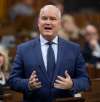WE Charity scandal triggers political ploys
Advertisement
Read this article for free:
or
Already have an account? Log in here »
To continue reading, please subscribe:
Monthly Digital Subscription
$0 for the first 4 weeks*
- Enjoy unlimited reading on winnipegfreepress.com
- Read the E-Edition, our digital replica newspaper
- Access News Break, our award-winning app
- Play interactive puzzles
*No charge for 4 weeks then price increases to the regular rate of $19.00 plus GST every four weeks. Offer available to new and qualified returning subscribers only. Cancel any time.
Monthly Digital Subscription
$4.75/week*
- Enjoy unlimited reading on winnipegfreepress.com
- Read the E-Edition, our digital replica newspaper
- Access News Break, our award-winning app
- Play interactive puzzles
*Billed as $19 plus GST every four weeks. Cancel any time.
To continue reading, please subscribe:
Add Free Press access to your Brandon Sun subscription for only an additional
$1 for the first 4 weeks*
*Your next subscription payment will increase by $1.00 and you will be charged $16.99 plus GST for four weeks. After four weeks, your payment will increase to $23.99 plus GST every four weeks.
Read unlimited articles for free today:
or
Already have an account? Log in here »
Hey there, time traveller!
This article was published 22/10/2020 (1877 days ago), so information in it may no longer be current.
SO it was another game of political chicken in Ottawa, as the parties wrangled about whether they would head to the polls over the WE issue. Try saying that five times fast.
The last time Canadians headed to the polls in a November election, it was an early election call in 2000, just three years into then-Prime Minister Jean Chretien’s term. It resulted in a triumphant return for the Liberals, who took advantage of nostalgia following the recent death of Pierre Trudeau and a disinterested electorate. The Liberals came back with an increased majority, while the Canadian Alliance Party, newly formed under Stockwell Day, made minor gains.
As tensions mounted on Parliament Hill Tuesday, it was interesting to watch Prime Minister Justin Trudeau’s language. His rhetoric did not stray much from his main phrases: “help Canadian families;” “exceptional circumstances;” “make parliament work.” Those phrases or derivatives of those phrases were used repeatedly both in question period and during media scrums as Trudeau drove home his message. He tried to play the victim, as if suggesting that it’s not the Liberals’ fault, but the opposition parties that don’t want to work things out.
At issue is the Conservative push to get more answers on the WE Charity controversy. The Liberals have been filibustering in standing committees for weeks, and the Conservatives put forward a motion to form a so-called “anti-corruption” committee to scrutinize government spending. The Liberals considered the motion to create the committee a confidence vote, meaning it could lead to a snap federal election.
The Liberals instead offered their own proposal for a COVID-19 committee, detailing their pitch Monday in a letter to the House leaders of the other parties. They’re proposing one that focuses on pandemic-related spending, with six Liberal MPs and six members of the opposition parties. The Tories’ version would have 15 MPs, with the opposition holding the majority.
An Abacus Poll done on Tuesday night asking 1,000 Canadians about the confidence motion revealed a relatively low level of engagement on the issue. According to the polling company: “About a third of those surveyed say they have been following this situation very or pretty closely. One in five Canadians (20 per cent) hadn’t heard of it. The rest had only a vague recollection. Compared to our norms this indicates a relatively low level of public engagement so far.”
This suggests suggestions to call a snap election on a non-confidence motion over the creation of a committee hasn’t really resonated with the public.
But that’s to be expected. Calling the creation of a committee a non-confidence motion takes some acrobatics. In fact, Alice Constantinou of the Library of Parliament told the Globe and Mail that the government has never fallen over the creation of a committee.
NDP MP Charlie Angus was incredulous at the possibility of it during question period: “The worst medical and economic catastrophe of the century and this prime minister has stated a willingness to plunge a nation into a pandemic election, all over the procedural wrangling of a committee. Seriously.”
Undoubtedly, Trudeau knows what he’s doing. The Liberal polling numbers are looking good. If an election is held now, they are likely to win again: whether it would be a majority is up in the air.
But party insiders are also very much aware of what happens if there’s a winter election, as when Canadians went to the polls in January 2006. It led to the minority government of Conservative Prime Minister Stephen Harper because of the sponsorship scandal, which culminated in the Gomery Inquiry and determined a blatant misuse of government money.
To say that didn’t end well for the Liberals would be an understatement. The 2006 election signalled years of exile for the party, which didn’t end until Justin Trudeau came along.
So, no wonder the Liberals are thinking of forcing the hand now rather than later, and looking to blame the opposition for doing their dirty work.
Angus said it best on Tuesday. The government, minority or not, is really in the driver’s seat. If it wants to call an election, all it has to do is “show some maturity” and either go to the governor general to end government or just let parliament do its job.
Shannon Sampert is a political scientist.
www.mediadiva.ca.
shannon@mediadiva.ca
Twitter: @CdnMediadiva


